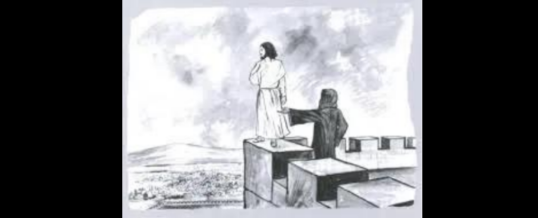
Testing or Trusting?
As a kid growing up in the 1960s and 1970s, the two things’ boys talked about most on the school yard were “Friday Night at the Fights” (boxing from Madison Square Garden in N.Y.C.) and stuntman Evel Knievel. We didn’t have pay-per-view, the wide range of live stream venues, or the internet to entertain us. Evel Knievel was a motorcycle daredevil who performed death-defying jumps over buses, cars, and even canyons to the thrill of audiences. He would break numerous bones, heal up, and do it again. Knievel seemed to be willing to throw away his health and even risk death for his 15 minutes of fame. That kind of cavalier, reckless attitude didn’t die when Evel Knievel died. Au contraire it has almost become the standard now in such things as ultimate cage fighting and extreme sports.
All of this reminds me of Jesus’ 40-day sojourn in the desert that we hear about each first Sunday of Lent. We traditionally call it the “temptations in the desert.” One of the temptations has the devil take Jesus to the parapet of the Temple and dares Jesus to jump. The false promise is that Jesus will have nothing to worry about because, if God exist, God will surely send His angels to protect Jesus from any harm. Jesus calls this a temptation. This showboating, for 15 minutes of fame, masquerades as faith in God but it is not faith at all. Jesus rebukes the devil with, “Do not put the Lord your God to the test.”
Sometimes, like Evel Knievel, we are willing to throw all common sense out the window, risk our health, our marriage, our good name, or even our lives, and expect God to save us. This is not trusting in the Lord; it’s testing the Lord. It’s living an irresponsible life.
Covid 19 saw lots of people resisting any talk of vaccinations, vaccinations for the common good (including their personal good). They even used Scripture to bolster their decisions and said things like, “I don’t need a vaccination; I have God on my side. God won’t let me get sick or die.” Inferred was the idea that those who received the vaccination were really not very faithful or trusting in God. The irony was that the “anti-vaxxers” were putting the Lord to the test all the while pretending to trust in God.
When we throw our struggles of life onto God with the attitude, “If you’re God, fix this!” We are acting irresponsibly. Passive responsibility is a contradiction in terms. As the late Jesuit Anthony DeMello said, “God cannot be bothered doing for you what you can do for yourself.”
On Jesus’ first return to his childhood synagogue, where everyone knew him, he spoke with authority and won the approval of all. They had heard that he had performed miracles elsewhere and now wanted their cut. “Do here in your hometown what we heard you did in Capernaum.” They were not willing to listen to his message or to change their ways. They wanted miracles…now! He was expected to hop to their demands, but there was going to be no conversion within themselves. We are told that Jesus did not work any miracles there because of their lack of faith. Perhaps he could not be bothered doing for them what they were too lazy to do for themselves.
Our struggles cannot be overcome by us acting on our own—sheer willpower—nor by opting out and turning everything over to divine will. Instead, the power of grace flows most fully when human will choose to act in harmony with divine will. It is the difference between testing God by avoiding one’s own responsibility and trusting God as one act responsibly. Perhaps that’s why the word trust is a better word than surrender. Surrendering something over to God prematurely can be an escape from responsibility and an insult to the free will God gave us. We are neither gods (“I’ll work this out for myself, thank you very much”) nor puppets (“Do here God, what I heard you did in other peoples’ lives).
Gerald May in his classic book, Addiction and Grace, says this: “God does not flash into our lives to work a piece of magic upon us then disappear. To do so would eradicate human dignity; it would prevent our participation…We are never simply visited with a healing or deliverance, which we can then safely forget. Grace is not a pill we are given, or a method applied to us so that we can simply go about our business. Grace always invites us forward. Every liberation requires attention, every healing demands continued care, every deliverance demands follow-up, and every conversion requires faithful deepening.”
God’s grace builds on and always invites human nature; they are partners, and we dare not separate them. “Liberation,” as Gerald May says, “must finally come through grace, not solely through one’s own efforts.”
Fr. Phil
MAR
2024

About the Author: